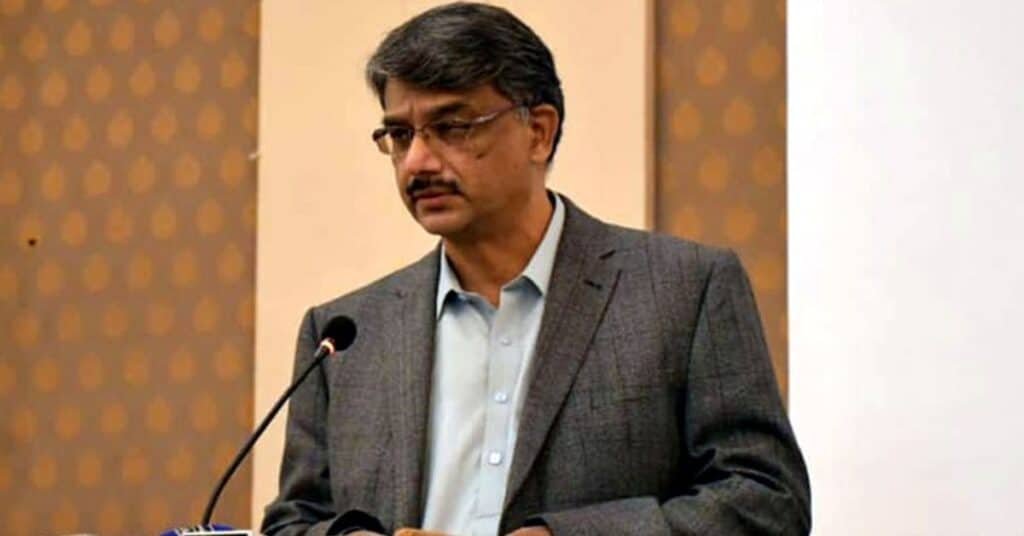By: Zulfiqar Ali (Kashmir Investigation Team)
MUZAFFARABAD: Two years have passed since the formation of the coalition government in Azad Kashmir and the election of Prime Minister Chaudhry Anwarul Haq, but still the debate continues regarding whether Haq’s election was constitutional or unconstitutional.
Chaudhry Anwarul Haq was elected Prime Minister of AJK on April 20, 2023, at 01:25 am, and received 48 votes in the 53-member house.
When the premier was contesting the election for the post of Prime Minister, he was also serving as the Speaker of the Azad Jammu and Kashmir (AJK) Legislative Assembly.
On the same day, 01 hour and 35 minutes after being elected Prime Minister, Chaudhry Anwarul Haq sent his resignation to AJK President Chaudhry Sultan Mahmood, in which it was written, “I have been elected by the Constituent Assembly of Azad Jammu and Kashmir as the Prime Minister of the Azad Government of the State of Jammu and Kashmir. Therefore, I submit my resignation from the post of Speaker on 3 (AM).”
The President has written “approved” and not “accepted” on the resignation, however, this does not make any difference to the status of the resignation. This means that the resignation has been accepted. But this resignation has not yet been published in the official gazette.
Some legal experts have said that if the resignation has not been published in the official gazette, then it has not yet been formally implemented. They said that a gazette publication is necessary for the resignation to be considered complete and legally effective.
After that, the newly elected Prime Minister, as the Speaker, adjourned the session of the assembly for an indefinite period after 12 hours and 48 minutes of his resignation.
On April 20, 2023, the newly elected Prime Minister issued a notification as the Speaker of AJK, which reads, “In exercise of the powers vested in me under sub-article 4 of Article 27 of the Interim Constitution of Azad Jammu and Kashmir, 1974, I, Chaudhry Anwarul Haq, Speaker Legislative Assembly, do adjourn the session of the Azad Jammu and Kashmir Legislative Assembly on Thursday, April 20, 2023 at 3:48 PM for an indefinite period.”
The session in which Chaudhry Anwarul Haq was elected Prime Minister was chaired by the Deputy Speaker during the election, and the Speaker himself was sitting with the members in the House, which was a violation of the Constitution and protocol.
According to Article 29, Sub-Article 4 of the Constitution, “The Speaker shall preside over the session of the Assembly and when the office of the Speaker is vacant or the Speaker is absent or for any reason unable to perform his duties, the Deputy Speaker shall perform the duties of the Speaker.”
Interestingly, when Chaudhry Anwarul Haq was elected Prime Minister, he had not resigned from the post of Speaker. This means that he was still the Speaker and was present in the session, so he had to preside over the session, and while being the Speaker, he could not contest the election for the post of Prime Minister.
Before contesting the election for the post of Prime Minister, he had to resign from the post of Speaker, after which the Speaker should have been elected first, under whose chairmanship the Assembly session would be held in which the Prime Minister would be elected.
Before Chaudhry Anwarul Haq’s election, the High Court of Azad Kashmir on May 11, 2023, disqualified the then Prime Minister Tanveer Ilyas Khan for two years for contempt of court, after which he ceased to be a member of the Assembly. On the same day, the Chief Election Commissioner issued a notification of his disqualification.
According to Article 17, Sub-Article 2 of the Constitution, “If the Prime Minister dies or the office of the Prime Minister falls vacant and the Assembly is in session at that time, the Assembly shall immediately proceed to elect a new Prime Minister. And if the Assembly is not in session, the President shall summon a session of the Assembly for that purpose, which shall be held within fourteen days of the death or vacancy of the Prime Minister.”
Interestingly, when Tanveer Ilyas Khan was disqualified on April 11, the Assembly was in session, and this session continued till April 20.
Now, the question is whether the election of the Prime Minister after 8 days was legally valid?
According to the Rules and Regulations of Azad Jammu and Kashmir, if the office of the Prime Minister falls vacant during the session of the Assembly, the Assembly shall immediately proceed to elect the Prime Minister under Rule 15.
According to Rule 15, two days before the date of the sitting held for the election of the Prime Minister, any member shall be entitled to propose the name of any other Muslim member for the election of the Prime Minister and for this purpose he shall submit the nomination paper proposed in the second statement to the Secretary and shall state in writing that he has satisfied himself that the proposed member is willing to act as Prime Minister if elected.
In terms of Rule 227 of the Rules and Regulations of the Azad Jammu and Kashmir Assembly, any member of the Assembly may, with the consent of the Speaker, move a motion to suspend the operation of any rule. If the motion is accepted, the said rule shall be suspended.
But no motion was made to suspend this rule on the occasion of the election of Chaudhry Anwarul Haq as Prime Minister.
Under Rule 227, a motion to suspend Rule 15 by a member of the assembly was required, followed by a vote and a majority vote.
Former Prime Minister of Azad Kashmir Raja Farooq Haider has filed a writ petition in the High Court of Azad Jammu and Kashmir on the same grounds, requesting that the election of the Prime Minister be declared null and void and unconstitutional. The date for hearing of this writ has been fixed for May 05, in which a decision will likely be taken to accept or reject this writ.




